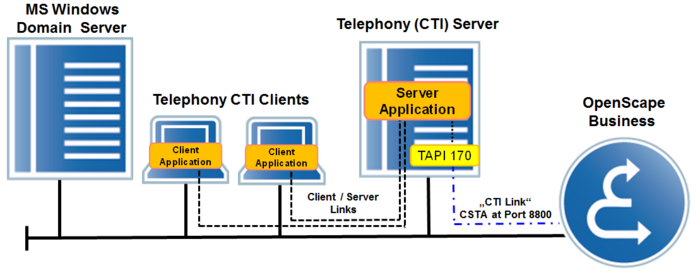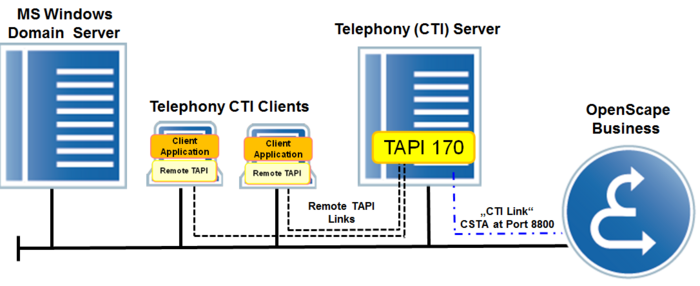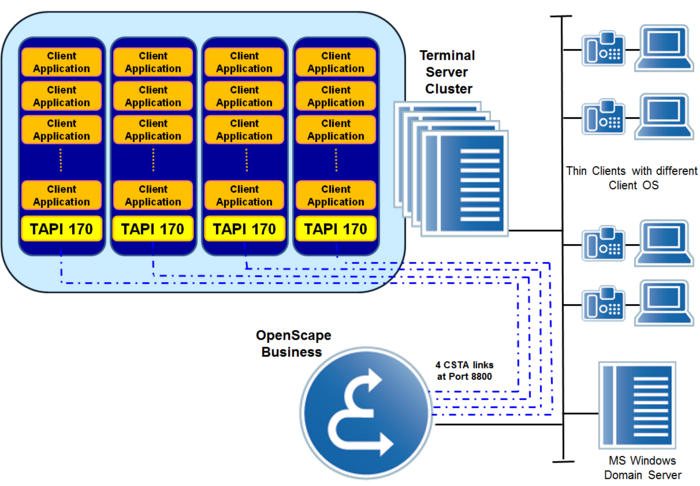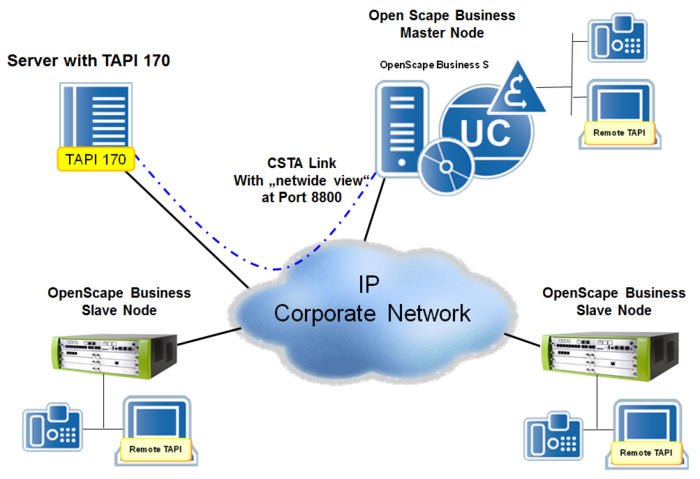OpenScape Business TAPI 170
The Wiki of Unify contains information on clients and devices, communications systems and unified communications. - Unify GmbH & Co. KG is a Trademark Licensee of Siemens AG.
Contents
- 1 Overview
- 2 Features
- 3 Connectivity
- 3.1 Connecting server-based TAPI Application to OpenScape Business using TAPI 170
- 3.2 Connecting Client-based TAPI Applications to OpenScape Business using TAPI 170
- 3.3 Connecting Terminal Server-based TAPI Applications to OpenScape Business using TAPI 170
- 3.4 Connecting TAPI 170 to Networked OpenScape Business Systems
- 4 Capacities
- 5 Compatibility
- 6 Prerequisites
- 7 Documentation
- 8 Software Delivery / Deployment
- 9 Licensing
- 10 SW Upgrade / Migration
- 11 Constraints
- 12 Useful Tools
- 13 Further technical Information
Overview
OpenScape Business TAPI 170 TSP is a "third party" telephony service provider that supports the Microsoft TAPI V2.1 functionality. TAPI 170 enables Microsoft Windows-based CTI applications to concurrently monitor and control phones or devices connected to OpenScape Business.
Features
- Centrally connected third-party TAPI Service Provider.
- Compatible with the Microsoft TAPI 2.1 Standard
- Telephony functions are available on each connected PC client via the TAPI 2.1 client/server architecture.
- No additional TSP client software is required
- Supported telephony features
- Selection or dialing of incoming/outgoing calls from the PC
- Transmission of incoming call number, if signaled
- Consultation and transfer
- Toggle/Connect
- Conferencing
- Call forwarding
- Forwarding callers
- Answering a call through the application
- Initiating a call through the application
- Blind/Supervised transfer (also called "transfer before answer / consultation transfer")
- Transmission of feature codes
- Monitoring of the phone (call states, failure, etc.)
- Provision of an ACD interface
- Monitoring / access to keypad for system telephones (HFA)
- Control of display/LED for system telephones (HFA)
- Connection to standalone and networked OpenScape Business systems
- Support for MULAP members / station numbers
Connectivity
The OpenScape Business TAPI 170 software is installed on a Microsoft Windows server on the network. The connection to OpenScape Business occurs via a CSTA link. A physical connection between the Windows PC and the phone is not required.
OpenScape Business TAPI 170 can be set up in different operating modes on single node systems or in the OpenScape Business network.
Connecting server-based TAPI Application to OpenScape Business using TAPI 170
The server applications and the TAPI 170 software are installed on the so-called "Telephony Server" in the network. The server applications provide their associated clients in the network with telephony features for stations that are configured within OpenScape Business TAPI 170. The TAPI 170 software is connected to the CSTA interface of OpenScape Business over the LAN.
For this connection, one CSTA link of OpenScape Business as well as one TAPI license for each configured TAPI station are required.
Figure: TAPI 170 with server-based TAPI Application
Connecting Client-based TAPI Applications to OpenScape Business using TAPI 170
In this scenario, the OpenScape Business TAPI 170 software is installed on a server on the network. On the client PCs with the TAPI applications, the so-called "Remote TAPI" function is enabled, via which the TAPI application on the client communicates with the TAPI 170 SW on the server. No TAPI 170 software needs to be installed on the client for this purpose. The TAPI 170 software is connected to the CSTA interface of OpenScape Business over the LAN. For this connection, one CSTA link of OpenScape Business as well as one TAPI license for each configured TAPI station are required.
Figure: TAPI 170 with remote TAPI
Connecting Terminal Server-based TAPI Applications to OpenScape Business using TAPI 170
In this scenario, the client-based TAPI applications are installed on one or more terminal servers. In this case, the TAPI 170 software is also installed on the terminal server. In the case of a cluster consisting of multiple terminal servers, the TAPI 170 software must be installed on each terminal server in the cluster. Each instance of the installed TAPI 170 software is connected to OpenScape Business over the LAN.
For each instance of the TAPI 170 software installed on a terminal server, one CSTA link of OpenScape Business is required. In addition, a TAPI license is also required for each configured TAPI station.
Note
The number of terminal servers that can be operated in the cluster is limited to the number of free CSTA links available within OpenScape Business for connecting the TAPI 170 software. This should be checked and taken into account before marketing.
Figure: TAPI 170 with Terminal Server-based TAPI application
Connecting TAPI 170 to Networked OpenScape Business Systems
For networked OpenScape Business systems, the TAPI 170 software is installed on one server, which is connected via the LAN to the CSTA interface of the master node.
This connection is independent of the previously mentioned operating modes of the TAPI 170 Service Provider (remote TAPI or server-based connection).
To implement this connection, one CSTA link of the OpenScape Business master node as well as one TAPI license for each configured TAPI station are required.
Note
Via the master node, the TAPI 170 receives network-wide access to all stations in the network.
If the TAPI 170 is connected to a slave node instead of the master node, TAPI 170 can access only the stations of the slave node.
When using multiple TAPI 170 in a terminal server cluster, one CSTA link to the master node is required for each TAPI 170.
Figure: TAPI 170 with networked OpenScape Business Systems
Capacities
The maximum number of TAPI 120 client PCs that can be connected to OpenScape Business depends on the model. More information on this can be found within the OpenScape Business Sales Information.
Compatibility
Supported Systems
- OpenScape Business X3
- OpenScape Business X5
- OpenScape Business X8
- Open Scape Business S
Supported Devices
TAPI 170 supports the same devices as the OpenScape Business CSTA interface.
These are described in section 1.6.11, "CSTA Interface".
Prerequisites
For operation of OpenScape Business TAPI 170 some HW / SW prereqisites have to be fulfilled
HW/SW prerequisites
Computer HW
The PC hardware must comply with at least the system requirements specified by Microsoft for the operating system used, provided that no further software applications other than TAPI 170 are being operated. In addition, an Ethernet LAN interface is required.
Computer SW
Operating systems
- Microsoft Windows Server
- Microsoft Server 2008 R2, 64 bit
- Microsoft Server 2012, 64 bit
- Microsoft Small Business Server 2011
- Microsoft Small Business Server 2012 (essential)
- Terminal Server
- Citrix XenApp 6.0, 6.5
- Microsoft Server 2008 R2, 64 bit
- Microsoft Server 2012, 64 bit
- Virtualization
- VMware vSphere 5
- Remote Client PC for Remote TAPI
- Microsoft Windows 7 (Ultimate, Professional)
- Microsoft Windows 8 (Pro, Enterprise) not Windows RT
- Microsoft Server 2008 R2
- Microsoft Server 2012
Note
In addition to the license for the server operating system, the Microsoft licensing model requires Microsoft device or User CALs corresponding to the number required for the planned expansion. These CALs are not included in the delivery of OpenScape Business TAPI 170 and must be purchased separately.
Under certain conditions specified by Microsoft, a "Windows Server for embedded systems" with the so-called "embedded Telco license" can be used for OpenScape Business TAPI 170.
OpenScape Business
In order to connect to OpenScape Business TAPI 170, one CSTA link of OpenScape Office is required, regardless of how many TAPI 170 clients are connected. This also applies to networked OpenScape Business systems.
Connection to a CSTA link requires either UC Booster Card or UC Booster Server
Documentation
Some documents in various languages are available for OpenScape Business TAPI 120. As there are:
- Installation manuals
- Technical release note
The documents can be obtained from the following source:
- Partner Portal of Unify
Software Delivery / Deployment
The OpenScape Business TAPI 170 software is supplied on a separate data medium. It is not part of the OpenScape Business System software. The software package can also be downloaded free of charge from the Software Download Server (SWS) within the Partner Portal of Unify.
Licensing
The use of OpenScape Business TAPI 170 is licensed on a subscriber basis. The licenses are managed within the OpenScape Business system. When using the "MULAP" feature, a TAPI license is required for each station within the MULAP.
SW Upgrade / Migration
Before migrating from HiPath 3000 with HiPath TAPI 170 V2 to OpenScape Business V1 with TAPI 170 ensure that a OpenScape Business TAPI License is available within OpenScape Business for every TAPI 170 user. Existing HiPath TAPI 170 user licenses cannot be used further on within OpenScape Business.
HiPath TAPI 170 SW has to be uninstalled and to be replaced by OpenScape Business TAPI 170 SW on the server PC.
Constraints
Only Microsoft Windows operating systems can be used in conjunction with TAPI 170.
The TAPI server and clients must be managed by the same network domain controller, if remote TAPI function is used.
The following applies to the terminal server environment:
- OpenScape Business TAPI 170 must be installed on the same server hardware as the terminal server.
- When using a terminal server cluster architecture, the TAPI 170 software must be installed on each terminal server in the cluster.
- The maximum possible number of OpenScape Business TAPI 170 servers in conjunction with OpenScape Business must not be exceeded. The maximum number of possible connections is reduced if the CSTA links of OpenScape Business are used by other CSTA applications.







